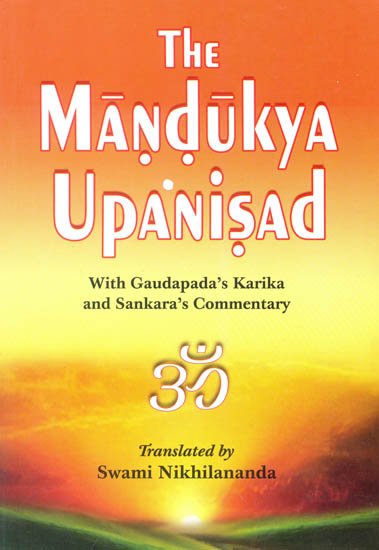Mandukya Upanishad (Gaudapa Karika and Shankara Bhashya)
by Swami Nikhilananda | 1949 | 115,575 words | ISBN-13: 9788175050228
This is verse 3.8 of the Mandukya Karika English translation, including commentaries by Gaudapada (Karika), Shankara (Bhashya) and a glossary by Anandagiri (Tika). Alternate transliteration: Māṇḍūkya-upaniṣad 3.8, Gauḍapāda Kārikā, Śaṅkara Bhāṣya, Ānandagiri Ṭīkā.
Mandukya Karika, verse 3.8
Sanskrit text, IAST transliteration and English translation
यथा भवति बालानां गगनं मलिनं मलैः ।
तथा भवत्यबुद्धानामात्माऽपि मलिनो मलैः ॥ ८ ॥yathā bhavati bālānāṃ gaganaṃ malinaṃ malaiḥ |
tathā bhavatyabuddhānāmātmā'pi malino malaiḥ || 8 ||8. As the ether appears to the ignorant children to be soiled by dirt, similarly, the Ātman also is regarded by the ignorant as soiled.
Shankara Bhashya (commentary)
As1 the diversity of experiences such as forms, functions, etc., is caused by the admitted differences of the Ghaṭākāśa, etc., so also is the experience of birth, death, etc., consequent on the perception of the different Jīvas, due to the limitations caused by Avidyā (ignorance). Therefore the contamination of misery, action and result (of action) caused by Avidyā does not really inhere in the Ātman. In order to establish this meaning by an illustration, the text says:—As in our ordinary experience it is found that the ignorant regard the Ākāśa (ether),—which, to those who know, the real nature of a thing by discrimination, is never soiled by any contamination—as soiled with cloud, dust and smoke, so also the Supreme Ātman, the Knower, the innermost Self directly perceived within, is regarded by those who do not know the real nature of the innermost Self, as affected by the evils of misery, action and result. But this is not the case with those who can discriminate. As in the desert are never found foam,2 waves, etc., though thirsty creatures falsely attribute these things to it, similarly the Ātman also is never affected by the turbidity of misery,3 etc., falsely attributed to it by the ignorant.
Anandagiri Tika (glossary)
The opponent may contend thus:—The statement that the Jīvas are neither an evolved effect nor a part of Brahman but identical with it is not correct For, Brahman is ever pure and non-dual whereas the Jīvas are many and ever affected by the contamination of passion, attachment, etc. This text refutes this contention.
1 As, etc.—Tn our relative experience we make a distinction between the different forms of Ākāśa enclosed by a jar, an eye of a.needle, or an extensive field. This knowledge of distinction, caused by various upādhis, unreal from the standpoint of Truth, makes us associate the undifferentiated Ākāśa with different forms, functions and names. In like manner, ignorant persons make a distinction of the Jīvas by associating the Ātman with the attributes of different bodies, etc., and consequently think of the Ātman as suffering from the effects of birth, death, misery, etc. This distinction in the non-dual Ātman which gives rise to the notion of birth, death, etc., is due to Avidyā which is subjective or which proceeds from the perceiver. This distinction does not, in reality, exist; hence Ātman is ever uncontaminated by the evils of birth, death, etc.
2 Foam, etc.—The ignorant, subject to the illusion of the mirage, associate the desert with foam, waves, etc. All the waters of the mirage, taken as real by the ignorant, do not soak one grain of sand in the desert as this water is unreal. Similarly all the evils attributed falsely to the Ātman by undiscriminating persons do not make it lose its innate purity by so much as an iota.
3 Misery—Misery or Kleśa has been defined by Patañjali as that which causes misery to the Jīvas. This Kleśa is of five kinds, viz., Avidyā (i.e., thinking the body which is non-self as the Self), Asmitā (i.e., regarding the Ātman as one with Buddhi or mind), Rāga (i.e., attachment), Dveṣa (i.e., the anger which a man feels when his desire to attain a particular object is frustrated), Abhinivesa (i.e., the fear of death, etc.).
